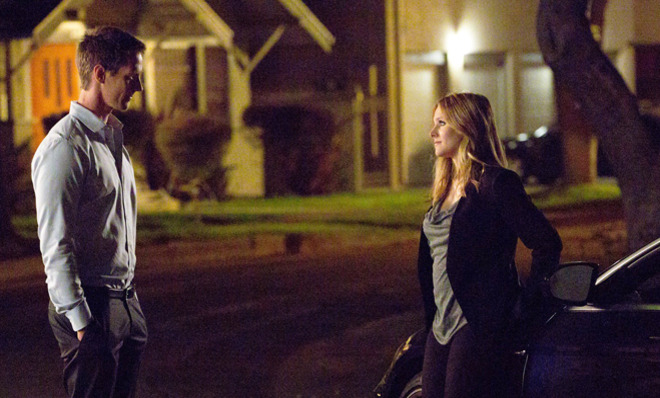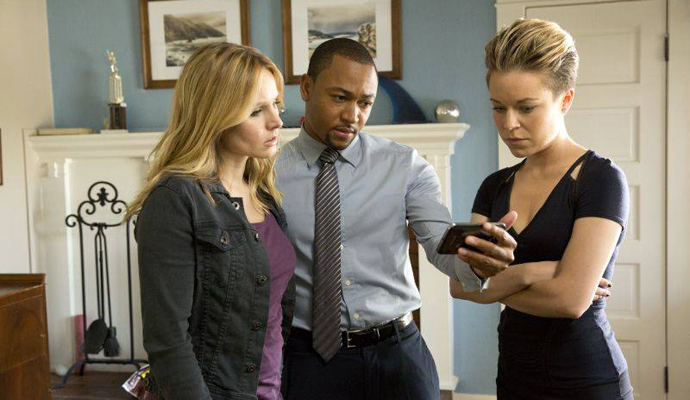Girls on Film: Veronica Mars told the wrong story
By focusing on cameos and fan service, the Kickstarter-funded movie failed to tie off the TV show's most intriguing dangling thread


A free daily email with the biggest news stories of the day – and the best features from TheWeek.com
You are now subscribed
Your newsletter sign-up was successful
"I've grown up, though. That was the old me; angry me; vengeful me. New me? People say I'm a marshmallow."
Ten years after she left TV, Veronica Mars — the sarcastic, crime-solving Neptune High student who escaped her small beach town and never looked back — returned in a Kickstarter-funded film (available on DVD/Blu-ray this week). The new Veronica eschews her status as a "marshmallow" to embrace her inner badass and solve another mystery.
Superficially, the movie's setup hits at the heart of what made the TV series so resonant: a girl whose quest for justice is fueled by her need for truth and her desire for revenge. But instead of exploring these elements as Veronica reenters a town on the brink of chaos, the film falls short, relying on repetition and shock drama in a kind of limbo between the studio and the fans.
The Week
Escape your echo chamber. Get the facts behind the news, plus analysis from multiple perspectives.

Sign up for The Week's Free Newsletters
From our morning news briefing to a weekly Good News Newsletter, get the best of The Week delivered directly to your inbox.
From our morning news briefing to a weekly Good News Newsletter, get the best of The Week delivered directly to your inbox.
As the story goes, creator Rob Thomas and star Kristen Bell loved Veronica so fiercely that they did whatever they could to keep her alive: multiple failed pitches and re-imaginings that finally culminated in the massive Kickstarter campaign that gave Veronica new life.
But Veronica Mars had always been plagued by outside interests. Network pressures led to the show's super-problematic third season, and now fan pressure created a film that pays more attention to the investors who facilitated the production than the needs of the story. Fan service was the value Veronica Mars could give to backers who didn't get a financial return on their investment, while the studio fed Veronica Mars into its own interests, finding the perfect way to lure users into the studio-backed, problem-riddled UltraViolet digital distribution system.

The Veronica Mars movie is an exercise in fandom — self-indulgent cinema that pleases the most loyal and alienates the rest with a series of in-jokes that stretch from casting to story arcs. The movie gives audiences the easiest and most superficial version of what they want, without exploring the resonant elements that could have easily turned Veronica Mars into what fans want and need.
Instead, Veronica Mars is a fun but depthless copy of the show's first season. Once again, Veronica's happy life is upended by a murder, which leads her down a rabbit hole of police incompetence, corruption, cover-ups, class warfare, and a whole bunch of sexual angst with Logan Echolls. Every element in the film reflects what came before: Wallace steals school files, Mac hacks computer systems, Madison is bitchy, Keith still wants Veronica to escape, and Neptune has another incompetent Sheriff Lamb. There is a school dance completely plagued by Logan's romantic drama, and Keith faces death while Logan cradles Veronica (with more talk of "epic" romance). Even the final showdown is reminiscent of Veronica's epic TV fight with Aaron Echolls.
A free daily email with the biggest news stories of the day – and the best features from TheWeek.com
It's fan service at its most superficial, regurgitating plot points instead of adding to the depth that actually made Veronica such a dynamic and beloved heroine in the first place: Her problematic relationship with Neptune, the addictive empowerment she feels as a detective, and Neptune's battle between the haves and have-nots.
Those things are acknowledged, but only in the small and disparate bits of time between the repetitive story arcs. Veronica's addiction to investigation is just a talking point between the major plot points in the murder of Carrie Bishop, and the class war simmers, but only as a side arc for supporting characters that seems more like a pitch for a new TV show than a film's plot point.
At first, Thomas teases the possibility of this other reality — a story in which Veronica returns to Neptune not to help her soulmate beat another death sentence, but to finally battle the Neptune class war between the rich '09ers and their poor neighbors, which has been percolating for over a decade. The film's quick intro boils the series into this essence: Veronica and Logan were kids who struggled in their own unique ways to deal with the death of Lily, while living in a town that seems glamorous, but was destined to be "ground zero" in an inevitable class war.

The movie begins as Veronica struggles with her undying commitment to action. She swears she's beyond her anger, but her trademark defiance is still present as she faces a sexist frat-boy type with a middle finger. Being a lawyer should be Veronica's next step — one that allows her to fight the good fight while avoiding the drama and brushes with death that plagued her teen years. But Thomas cleverly reveals the big flaw in her plan: The law office doesn't want her to fight — they want her to defuse fights before they happen. It's not Veronica's style, and it's no surprise when their job offer isn't as compelling as the lure of Neptune's corruption. Veronica isn't one to shrug and ignore; she faces and fights.
Unfortunately, Thomas has her fight more high school battles. While darker and more compelling drama is pushed to the side, Veronica destroys her future for another high school story of affluence, excess, death, and a sadistic madman. By focusing on the superficial and familiar, Veronica Mars offers an onslaught of violence without any actual depth: Two characters are killed off before the film begins, another two die during the investigation, and two more just narrowly avoid death. In the rush to finish the story, death becomes a casual consequence rather than a topic of exploration and growth.
It's all the more frustrating because Thomas could have given fans all they wanted and offered the depth that made the original series more than fluff by actually paying off the long-teased class war, which would make the film a more logical extension of the show. Suddenly, every character would move from toothless cameo to essential player, because a class war would focus on those Veronica always helped or battled instead of new, easily expendable characters. It would give Veronica's reasons to stay, and Keith's desire for her to flee, extra gravitas. It would be a higher-stakes, more cinematic extension of the show that would wrap its one still-dangling plot point: The unrest between the rich '09ers and the poor neighbors they terrorize.
Veronica Mars never could resist the lure of a mystery (and the lure of Logan), but that is part of a greater truth: Veronica Mars never could resist finding the truth and fighting the lies. Truth was paramount — over corruption, over safety, and even over ideology. Veronica is the balancing force. This is why she could help the haves as well as the have-nots, and why she was always in the middle of Neptune's big battles. It made "us versus them" into a more complicated and nuanced fight.
To fight so long to bring her back, and not give her the fight she's been prepping for over the course of the series, is a missed opportunity.
Girls on Film is a weekly column focusing on women and cinema. It can be found at TheWeek.com every Friday morning. And be sure to follow the Girls on Film Twitter feed for additional femme-con.
Monika Bartyzel is a freelance writer and creator of Girls on Film, a weekly look at femme-centric film news and concerns, now appearing at TheWeek.com. Her work has been published on sites including The Atlantic, Movies.com, Moviefone, Collider, and the now-defunct Cinematical, where she was a lead writer and assignment editor.
-
 Antonia Romeo and Whitehall’s women problem
Antonia Romeo and Whitehall’s women problemThe Explainer Before her appointment as cabinet secretary, commentators said hostile briefings and vetting concerns were evidence of ‘sexist, misogynistic culture’ in No. 10
-
 Local elections 2026: where are they and who is expected to win?
Local elections 2026: where are they and who is expected to win?The Explainer Labour is braced for heavy losses and U-turn on postponing some council elections hasn’t helped the party’s prospects
-
 6 of the world’s most accessible destinations
6 of the world’s most accessible destinationsThe Week Recommends Experience all of Berlin, Singapore and Sydney
